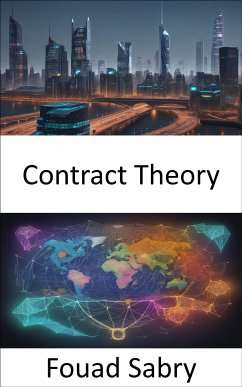What is Contract Theory
A contract is an institutional arrangement for the movement of resources, which defines the various connections between the parties to a transaction or limits the rights and obligations of the parties. From a legal perspective, a contract is an arrangement that makes it possible for resources to flow differently.
How you will benefit
(I) Insights, and validations about the following topics:
Chapter 1: Contract theory
Chapter 2: Index of economics articles
Chapter 3: Moral hazard
Chapter 4: The Market for Lemons
Chapter 5: Complete contract
Chapter 6: Adverse selection
Chapter 7: Information asymmetry
Chapter 8: Coase theorem
Chapter 9: Incentive
Chapter 10: Mechanism design
Chapter 11: Principal-agent problem
Chapter 12: Efficiency wage
Chapter 13: Theory of the firm
Chapter 14: Information economics
Chapter 15: Personnel economics
Chapter 16: Agency cost
Chapter 17: Signalling (economics)
Chapter 18: Single-crossing condition
Chapter 19: Screening (economics)
Chapter 20: Incomplete contracts
Chapter 21: Multiple principal problem
(II) Answering the public top questions about contract theory.
(III) Real world examples for the usage of contract theory in many fields.
(IV) Rich glossary featuring over 1200 terms to unlock a comprehensive understanding of contract theory. (eBook only).
Who will benefit
Professionals, undergraduate and graduate students, enthusiasts, hobbyists, and those who want to go beyond basic knowledge or information for any kind of contract theory.
A contract is an institutional arrangement for the movement of resources, which defines the various connections between the parties to a transaction or limits the rights and obligations of the parties. From a legal perspective, a contract is an arrangement that makes it possible for resources to flow differently.
How you will benefit
(I) Insights, and validations about the following topics:
Chapter 1: Contract theory
Chapter 2: Index of economics articles
Chapter 3: Moral hazard
Chapter 4: The Market for Lemons
Chapter 5: Complete contract
Chapter 6: Adverse selection
Chapter 7: Information asymmetry
Chapter 8: Coase theorem
Chapter 9: Incentive
Chapter 10: Mechanism design
Chapter 11: Principal-agent problem
Chapter 12: Efficiency wage
Chapter 13: Theory of the firm
Chapter 14: Information economics
Chapter 15: Personnel economics
Chapter 16: Agency cost
Chapter 17: Signalling (economics)
Chapter 18: Single-crossing condition
Chapter 19: Screening (economics)
Chapter 20: Incomplete contracts
Chapter 21: Multiple principal problem
(II) Answering the public top questions about contract theory.
(III) Real world examples for the usage of contract theory in many fields.
(IV) Rich glossary featuring over 1200 terms to unlock a comprehensive understanding of contract theory. (eBook only).
Who will benefit
Professionals, undergraduate and graduate students, enthusiasts, hobbyists, and those who want to go beyond basic knowledge or information for any kind of contract theory.
Dieser Download kann aus rechtlichen Gründen nur mit Rechnungsadresse in A, B, BG, CY, CZ, D, DK, EW, E, FIN, F, GR, H, IRL, I, LT, L, LR, M, NL, PL, P, R, S, SLO, SK ausgeliefert werden.









